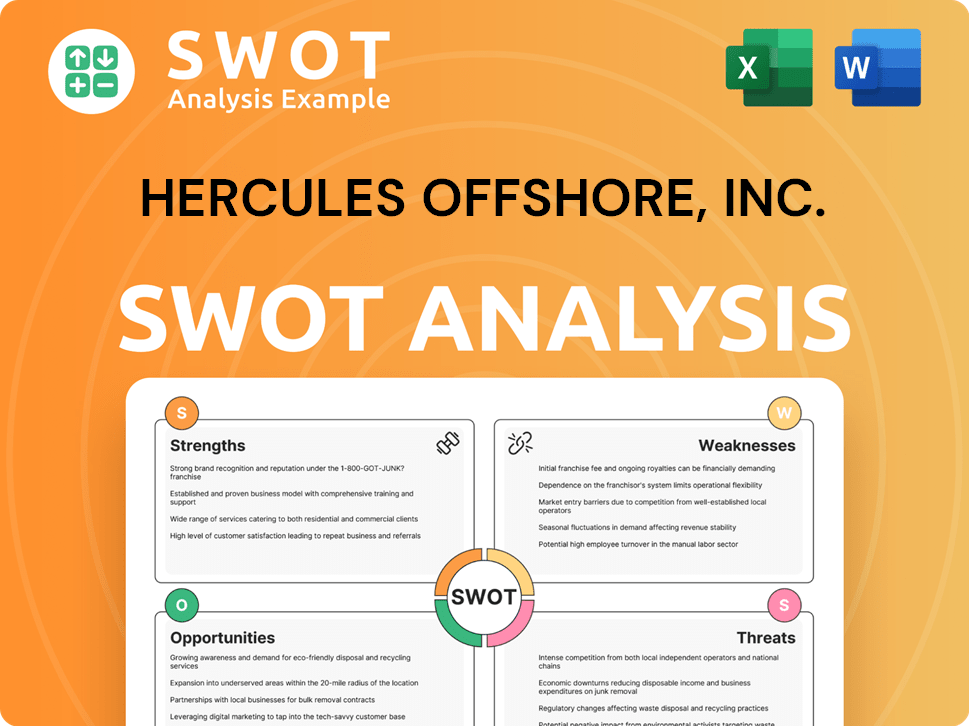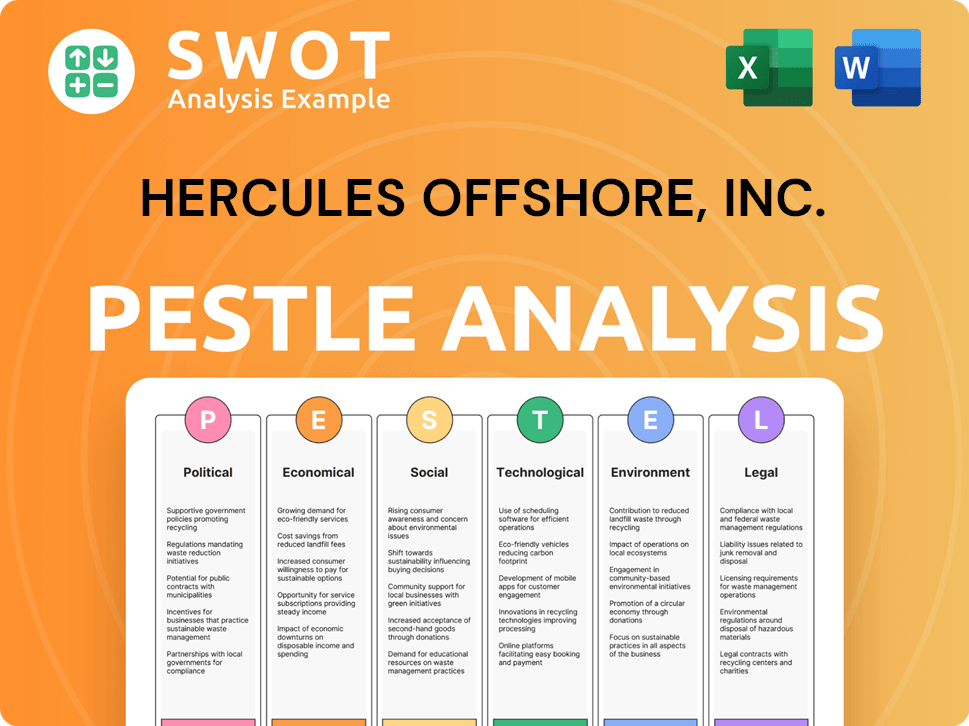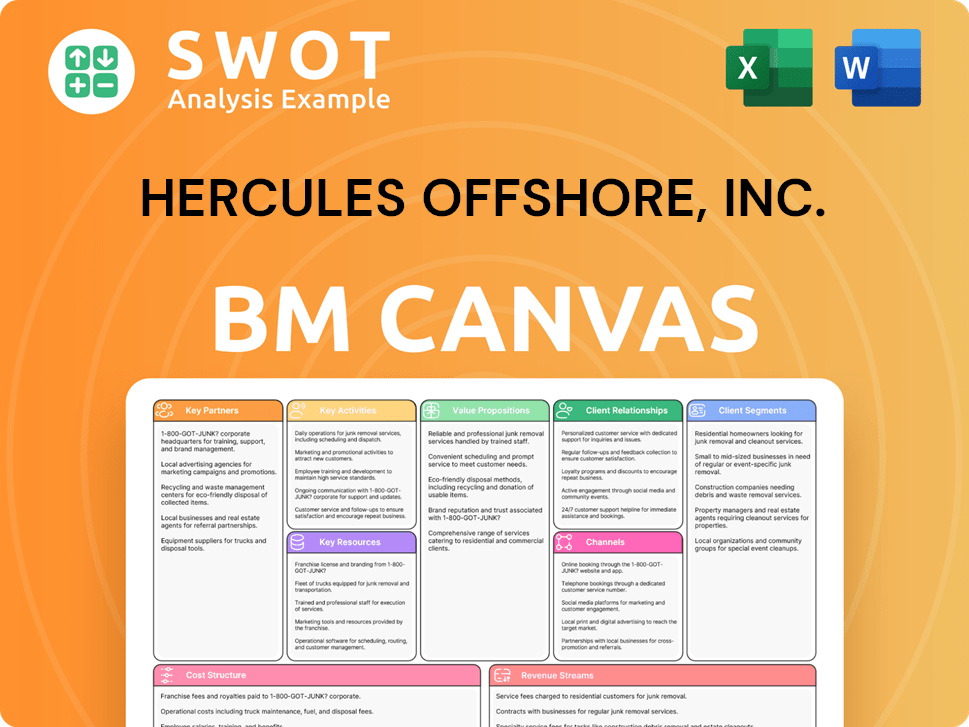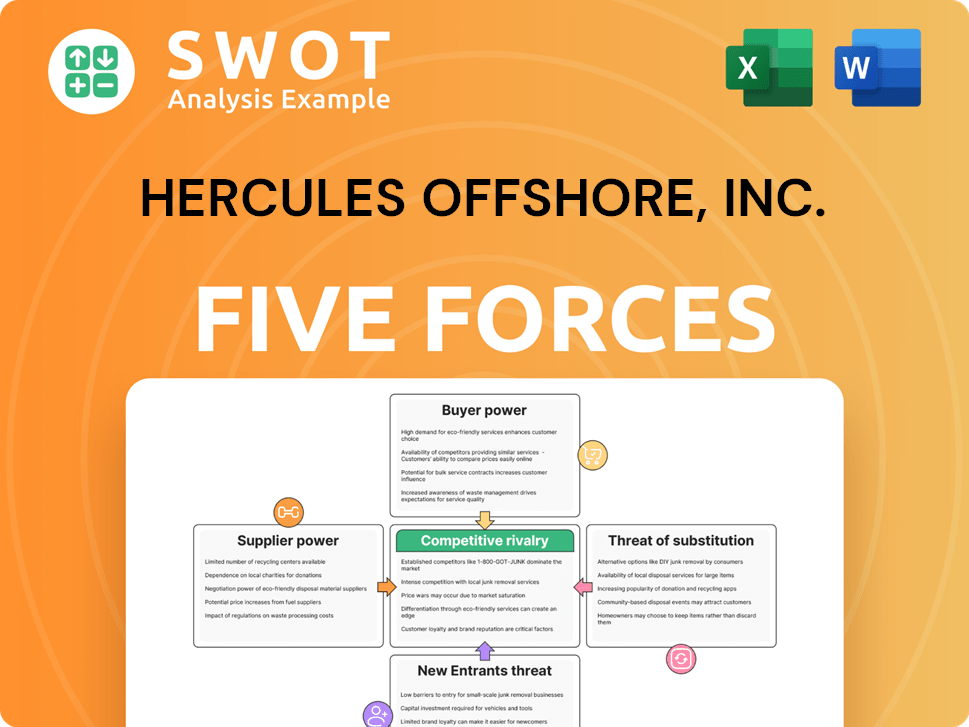Hercules Offshore, Inc. Bundle
Could Hercules Offshore Have Survived the Offshore Drilling Downturn?
The offshore drilling sector is a volatile arena, where fortunes can shift dramatically with market fluctuations. Hercules Offshore, Inc., a once-dominant player in shallow water drilling, faced an abrupt change in its trajectory. Founded in 2004, the company quickly built a substantial fleet, aiming for leadership in the offshore drilling market.

This exploration delves into the Hercules Offshore, Inc. SWOT Analysis and its growth strategy, or lack thereof, offering a critical examination of its rise and eventual decline. Understanding the challenges faced by Hercules Offshore provides invaluable insights into the importance of robust growth strategies and adaptability within the Oil and Gas Industry. The company's story serves as a compelling case study for any business navigating the complexities of the Offshore Drilling sector, examining its Company Performance and market position.
How Is Hercules Offshore, Inc. Expanding Its Reach?
Early expansion efforts by Hercules Offshore were primarily focused on growing its fleet and diversifying its geographic presence within the shallow water drilling market. Founded in 2004, the company quickly expanded its jackup rig and liftboat fleet through acquisitions and newbuild programs. This strategy aimed to capitalize on the rising demand for offshore drilling services during a period of high oil prices.
The company invested significantly in both domestic (U.S. Gulf of Mexico) and international markets, including West Africa, the Middle East, and Southeast Asia. The goal was to leverage a large, diverse fleet to capture market share and achieve economies of scale in shallow water operations, serving a broad base of oil and gas operators. The Brief History of Hercules Offshore, Inc. details the company's journey through these expansion phases.
However, the offshore drilling market deteriorated, and Hercules Offshore's expansion initiatives faced significant challenges. The company attempted to adapt by focusing on cost reduction and operational efficiency. The oversupply of rigs and declining day rates severely impacted its ability to generate sufficient revenue to service its substantial debt. While the initial strategy aimed at accessing new customers and diversifying revenue streams globally, the rapid decline in industry activity outpaced the benefits of these expansions.
The company's expansion plans were significantly impacted by the downturn in the offshore drilling market. The oversupply of rigs and declining day rates made it difficult to maintain profitability. The company's debt burden became unsustainable.
- Oversupply of Rigs: The market became saturated with drilling rigs.
- Declining Day Rates: The cost per day for rig services decreased.
- Unsustainable Debt: The company struggled to manage its debt obligations.
- Market Downturn: The overall decline in the oil and gas industry impacted the company's performance.
Hercules Offshore, Inc. SWOT Analysis
- Complete SWOT Breakdown
- Fully Customizable
- Editable in Excel & Word
- Professional Formatting
- Investor-Ready Format

How Does Hercules Offshore, Inc. Invest in Innovation?
In the context of Owners & Shareholders of Hercules Offshore, Inc., the innovation and technology strategy was centered around maintaining a competitive and efficient fleet. The primary focus was on optimizing existing assets and operational excellence rather than pioneering new technologies. This approach aimed to improve the company's position within the competitive offshore drilling market.
The company's strategy involved upgrading its jackup rigs and liftboats. This involved investing in newer, more capable assets to enhance drilling efficiency and reliability. These improvements were crucial for securing contracts in a competitive market. This focus on operational efficiency was a form of innovation within the constraints of the industry.
While not at the forefront of developing disruptive technologies, the company aimed to leverage proven technologies. This included adopting advanced drilling control systems and implementing digital solutions for operational reporting and data management. The goal was to offer reliable and cost-effective drilling services. This approach was a strategic response to the commodity-driven nature of the oil and gas industry.
The company's strategy included several key elements to enhance operational efficiency. This involved upgrading existing rigs to improve drilling performance and reduce downtime. Digital solutions were implemented to improve decision-making. These efforts were critical for maintaining a competitive edge in the offshore drilling market.
- Rig Upgrades: Investments in rig upgrades to improve drilling capabilities and reliability.
- Digital Solutions: Implementation of digital tools for operational reporting and data management.
- Maintenance Programs: Rigorous maintenance programs to reduce downtime and ensure operational readiness.
- Cost-Effectiveness: Focus on providing cost-effective drilling services to attract and retain clients.
Hercules Offshore, Inc. PESTLE Analysis
- Covers All 6 PESTLE Categories
- No Research Needed – Save Hours of Work
- Built by Experts, Trusted by Consultants
- Instant Download, Ready to Use
- 100% Editable, Fully Customizable

What Is Hercules Offshore, Inc.’s Growth Forecast?
Given that Hercules Offshore, Inc. ceased operations in December 2016 following Chapter 11 liquidation, a current financial outlook for the company is nonexistent. The firm's demise was primarily due to the sustained downturn in oil prices, which led to an oversupply of drilling rigs in the offshore market. This situation significantly impacted the company's financial health.
The company's financial struggles were characterized by declining revenues, negative profit margins, and an unsustainable level of debt. Despite a restructuring effort in 2015 to alleviate its debt burden, the prolonged industry slump proved too challenging to overcome. The shift in the company's strategic focus, from aggressive growth to survival and ultimately liquidation, underscores the severity of the market conditions.
Historical financial reports from Hercules Offshore would have revealed substantial capital expenditures for fleet expansion, followed by significant impairment charges and asset write-downs as market conditions deteriorated. For a deeper understanding of the competitive environment at the time, consider reviewing the Competitors Landscape of Hercules Offshore, Inc.
The decline in oil prices was a major factor in the company's financial distress. Lower oil prices reduced exploration and production spending by oil companies. This, in turn, decreased the demand for offshore drilling services, directly impacting Hercules Offshore's revenue streams.
Market analysis at the time would have shown an oversupply of drilling rigs. This oversupply led to lower day rates and reduced utilization rates for Hercules Offshore's fleet. The company's ability to generate sufficient cash flow was severely hampered by these market dynamics.
The company's performance was marked by consistent losses and a growing debt burden. Financial reports would have shown a decline in revenue and a decrease in profitability. The strategic shift from expansion to cost-cutting measures reflected the challenging environment.
The company's substantial debt became unsustainable as revenues fell. The restructuring efforts in 2015 were not enough to prevent the need for Chapter 11 liquidation. The liquidation process aimed to resolve the debt and distribute assets to creditors.
The initial growth strategy, which focused on fleet expansion, proved unsustainable due to market conditions. The company's failure to adapt to the changing market dynamics and the prolonged downturn in oil prices led to its eventual liquidation.
Since the company no longer exists, there is no future outlook for Hercules Offshore. The company's history serves as a reminder of the risks associated with the offshore drilling industry and the importance of adapting to market changes.
Hercules Offshore, Inc. Business Model Canvas
- Complete 9-Block Business Model Canvas
- Effortlessly Communicate Your Business Strategy
- Investor-Ready BMC Format
- 100% Editable and Customizable
- Clear and Structured Layout

What Risks Could Slow Hercules Offshore, Inc.’s Growth?
The story of Hercules Offshore, Inc. is a cautionary tale of how quickly fortunes can reverse in the volatile offshore drilling sector. The company faced a confluence of challenges that ultimately led to its downfall, highlighting the inherent risks of the oil and gas industry. Understanding these risks is crucial for anyone analyzing the Target Market of Hercules Offshore, Inc. and its potential.
The primary driver of Hercules Offshore's struggles was the sharp decline in crude oil prices, beginning in mid-2014. This downturn significantly reduced exploration and production (E&P) spending by oil and gas companies, directly impacting the demand for offshore drilling rigs. The resulting oversupply of rigs in the market led to a dramatic decrease in day rates and utilization levels, eroding the company's revenue streams and profitability.
Moreover, the offshore drilling industry is intensely competitive, with numerous players vying for a limited number of contracts. This competition put immense pressure on Hercules Offshore's pricing and margins. The company also grappled with regulatory changes, particularly in the wake of events like the Deepwater Horizon incident, which increased operational complexities and costs in certain regions.
The collapse in oil prices, starting in 2014, was a major blow. E&P spending cuts by oil and gas companies directly reduced demand for offshore drilling services. This led to an oversupply of rigs and a drastic fall in day rates.
The offshore drilling sector is highly competitive. Many companies compete for a limited number of contracts. This intensified the pressure on pricing and profit margins, making it difficult for Hercules Offshore to secure profitable deals.
Regulatory changes, especially after events like the Deepwater Horizon incident, increased operational complexities. These changes led to higher operational costs in critical regions, such as the U.S. Gulf of Mexico, further straining the company's resources.
The company's substantial debt load became an insurmountable obstacle. When revenues plummeted, liquidity crises emerged, ultimately leading to bankruptcy. Despite efforts to restructure debt, the market downturn proved too severe.
Supply chain issues, although not the main problem, could cause operational delays. Delays or higher costs for equipment and services could have impacted operations. These vulnerabilities added to the overall operational challenges.
Management attempted risk mitigation strategies, including debt restructuring and cost-cutting. However, the severity and duration of the market downturn were too significant. These efforts could not fully offset the impact of the challenging market conditions.
By 2015, Hercules Offshore reported a net loss of approximately $600 million, reflecting the severe impact of the market downturn. The company's debt burden was substantial, with over $1 billion in outstanding debt at the time of its bankruptcy filing. Rig utilization rates plummeted to below 50% for some segments of its fleet, significantly reducing revenue generation.
The offshore drilling market experienced a contraction, with day rates for jack-up rigs, a key part of Hercules Offshore's fleet, declining by over 50% in some regions. The overall number of active offshore rigs decreased significantly, reflecting reduced exploration and production activities by oil and gas companies. The volatility in oil prices, such as the fluctuations seen between 2024 and early 2025, directly affected the investment decisions of companies in the oil and gas sector.
Hercules Offshore, Inc. Porter's Five Forces Analysis
- Covers All 5 Competitive Forces in Detail
- Structured for Consultants, Students, and Founders
- 100% Editable in Microsoft Word & Excel
- Instant Digital Download – Use Immediately
- Compatible with Mac & PC – Fully Unlocked

Related Blogs
- What are Mission Vision & Core Values of Hercules Offshore, Inc. Company?
- What is Competitive Landscape of Hercules Offshore, Inc. Company?
- How Does Hercules Offshore, Inc. Company Work?
- What is Sales and Marketing Strategy of Hercules Offshore, Inc. Company?
- What is Brief History of Hercules Offshore, Inc. Company?
- Who Owns Hercules Offshore, Inc. Company?
- What is Customer Demographics and Target Market of Hercules Offshore, Inc. Company?
Disclaimer
All information, articles, and product details provided on this website are for general informational and educational purposes only. We do not claim any ownership over, nor do we intend to infringe upon, any trademarks, copyrights, logos, brand names, or other intellectual property mentioned or depicted on this site. Such intellectual property remains the property of its respective owners, and any references here are made solely for identification or informational purposes, without implying any affiliation, endorsement, or partnership.
We make no representations or warranties, express or implied, regarding the accuracy, completeness, or suitability of any content or products presented. Nothing on this website should be construed as legal, tax, investment, financial, medical, or other professional advice. In addition, no part of this site—including articles or product references—constitutes a solicitation, recommendation, endorsement, advertisement, or offer to buy or sell any securities, franchises, or other financial instruments, particularly in jurisdictions where such activity would be unlawful.
All content is of a general nature and may not address the specific circumstances of any individual or entity. It is not a substitute for professional advice or services. Any actions you take based on the information provided here are strictly at your own risk. You accept full responsibility for any decisions or outcomes arising from your use of this website and agree to release us from any liability in connection with your use of, or reliance upon, the content or products found herein.